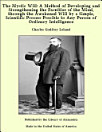關於這本電子書
The Etruscans are one of history's great mysteries -- a sophisticated society that flourished at the heart of the Classical world and then vanished, leaving relatively few archaeological remains and few records of their culture. The Etruscans were adept at magic, and Etruscan books of spells were common among the Romans but they have not survived. While greatly influenced by the Greeks, the Etruscans retained elements of an ancient non-Western culture, and these archaic traits contributed greatly to the civilization once thought of as purely Roman (gladiators, for example, and many kinds of divination). Leland retrieves elements of Etruscan culture from the living popular traditions of remote areas of the Italian countryside where belief in "the old religion" survives to an astonishing degree. Recorded when many of these secret beliefs and practices were fading away, this remarkable volume deals with ancient gods, spirits, witches, incantations, prophecy, medicine, spells, and amulets, giving full descriptions, illustrations, and instructions for practice.
關於作者
Charles Godfrey Leland was born in Philadelphia on August 15, 1824, the eldest child of commission merchant Charles Leland and his wife Charlotte. Leland loved reading and language. When he moved to Europe to study law, he became intrigued with German culture, gypsy lore, the language of Romany, and Shelta, an ancient dialect spoken by Irish and Welsh gypsies. After his law studies were completed, Leland became a journalist, working for such periodicals as P.T. Barnum's Illustrated News, Vanity Fair, and Graham's Magazine. The mid-to-late 1850s were very eventful for Leland; he published his first book, Meister Karl's Sketch-Book in 1855 and married Eliza Bella Fisher in 1856. What probably clinched his fame was "Hans Breitmann's Party" a German dialect poem that he wrote under the pen name Hans Breitmann and that captured the Pennsylvania Dutch dialect and humor. While he was best known for his essays, poetry, and humor, Leland also firmly believed that the industrial arts were the keys to a good education, and he wrote many textbooks on the subject. Leland spent most of the latter part of his life in Europe, writing a wealth of books. He died in Florence, Italy, on March 20, 1903.
為這本電子書評分
請分享你的寶貴意見。
閱讀資訊
智能手機和平板電腦
手提電腦和電腦
你可以使用電腦的網絡瀏覽器聆聽在 Google Play 上購買的有聲書。
電子書閱讀器及其他裝置
如要在 Kobo 等電子墨水裝置上閱覽書籍,你需要下載檔案並傳輸到你的裝置。請按照說明中心的詳細指示,將檔案傳輸到支援的電子書閱讀器。








